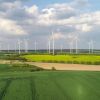New energy for Uganda and Rwanda
A reliable supply of water and electricity cannot be taken for granted in East Africa. Germany is committed to changing this.

Gregory Tayi is proud of what he has achieved. He is the first private entrepreneur to build a small-scale hydroelectric power station in Rwanda. Ever since, the little town of Murunda has blossomed: private homes, a hospital, a school and many micro businesses with electrical equipment are now hooked up to the stable power grid that Repro – his company – has established. There is a lot more hustle and bustle in the town than before. Even a bar can remain open late into the evening because streetlamps are there to light up the square.
In 2010, Tayi responded to a call for tenders issued by the Rwandan Ministry of Infrastructure and the Energising Development (EnDev) programme that is being implemented by the Deutsche Gesellschaft für Internationale Zusammenarbeit (GIZ) on behalf of the Federal Ministry for Economic Cooperation and Development (BMZ) and other donors. In inviting tenders, the participating partners wanted to get the private sector involved in supplying power to rural regions. Only 18 percent of Rwandans have access to the electricity network – in rural areas the figure is even below two percent. Much of the power supply infrastructure was destroyed during the 1994 genocide, with the result that many sectors of the economy in Rwanda are unable to exploit their growth potential. People whose homes are not connected to the grid use light sources that are harmful to health or expensive, such as kerosene or battery-powered lamps.
The power of water
Why not use the power of the water in Rwanda’s many small rivers, Gregory Tayi thought to himself. He came up with a plan, and his firm was commissioned to build and operate the first hydroelectric power station. The GIZ provided technical, expert and financial support, though it also required the company to take full responsibility for the project from start to finish, and also to invest in it itself. With the programme on his side, Tayi was able to take out a bank loan. He recruited 300 construction workers. Four years later, he still employs four permanent staff and as many as eight casual workers. His Murunda power station is already making a profit, and he is launching new projects for his country. “Helping improve the lives of people is more important to me than profit. What good does it do me if I am rich but everyone around me is poor”, remarks Tayi, an entrepreneur with a social conscience.
Access to light and power for 700,000 people in Rwanda
Operating in 25 countries in Africa, Asia and Latin America, the EnDev programme aims to use hydroelectric power, solar lamps, biogas and isolated networks to provide nearly 700,000 people in Rwanda alone with access to light and power by 2019. To ensure sustainability, it cooperates with small and medium-sized enterprises. “For the first time, the government of Rwanda has established sustainable market economy-based structures in the area of energy supply”, says GIZ energy expert Michael Köberlein with some satisfaction. “By providing somewhat in excess of two million euros, tender invitations were able to create effective incentives to generate competition between providers, mobilising more than 20 companies to invest in this sector. This has resulted in a power supply system in rural Rwanda that really works”, explains Köberlein.
One river, one people, one vision
Despite considerable advances having been made, 30 percent of the population in neighbouring Uganda – especially those living in urban slums – still has no access to clean water or sanitary facilities. In some rural regions, only six percent of households are connected to power grids. Yet Uganda has many lakes and rivers, making it the East African country with the most plentiful supply of water. Lake Victoria and the White Nile provide fresh water, as well as water power for generating energy. Since demand for water and electricity to satisfy the needs of the growing populations and economies is continuing to increase throughout the region, cross-border collaboration in the Nile basin provides an opportunity to develop new forms of cooperation.
Established by the Nile riparian states in 1999 and based in Uganda, the Nile Basin Initiative (NBI) helps promote a peaceful dialogue. Together with other donors, Germany has for many years partnered the initiative and its member states – besides Uganda, these are Egypt, Ethiopia, Burundi, the Democratic Republic of Congo, Kenya, Rwanda, South Sudan, Sudan and Tanzania. They discuss and agree on how the river’s water resources can be jointly developed in the long term and managed for the benefit of all. The increased cooperation aims to create a basis for mutual trust. What can be done to curb pollution of the water resources? To what extent can access to water help people arm themselves against the impact of climate change? How can regional power grids compensate for conflicts over water rights?
Greater water awareness
Numerous water experts are searching for answers and are jointly working to find regional solutions. “The Nile Basin Initiative will celebrate its 18th birthday in February 2017. Today it is an established and effective organisation. There is much greater awareness in the riparian states that the Nile is a valuable resource but one which must be shared”, observes Sarah Bebb, an adviser deployed to the NBI secretariat by the GIZ. On behalf of the BMZ, the GIZ has already been supporting transboundary water cooperation in the Nile basin on a national and international level since 2002, and is strengthening the expertise and knowledge of political decision-makers and staff at national authorities. “NBI has continued to train professionals in water and related fields and also equip our countries with information on existing development potentials to benefit our people”, is how Uganda’s Minister of Water and Environment Sam Cheptoris summed up the successful cooperation during the 24th Annual Nile-COM meeting in the summer of 2016. Over 99 percent of Uganda’s territory is situated in the Nile basin, so the river affects the lives of its 35 million inhabitants. The drought in East Africa looks set to worsen in 2017. Sustainable use of the available water resources will also remain the uppermost priority in the future.

